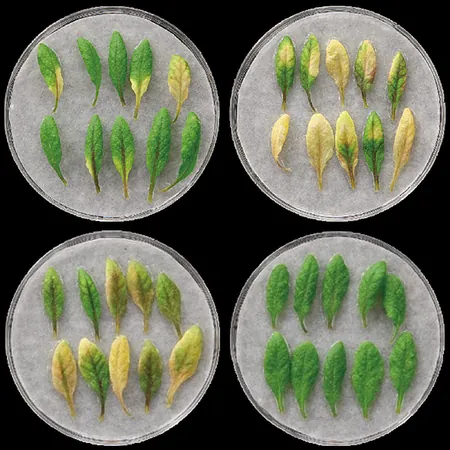
Revolutionary Discovery: Molecules That Could Transform Plant Aging and Agriculture!
2024-10-31
Author: Arjun
Revolutionary Discovery: Molecules That Could Transform Plant Aging and Agriculture!
In a groundbreaking study, an international team of scientists has identified two small molecules produced by the widely-studied plant Arabidopsis thaliana that play opposing roles in the aging process of plant leaves. These molecules, known as peptides, are short chains of amino acids. Notably, the peptide SCOOP10 accelerates leaf aging, while its counterpart, SCOOP12, suppresses it. Together, these peptides are believed to regulate the plant aging process, paving the way for potentially significant advancements in agricultural practices.
The collaborative research team included experts from esteemed institutions, such as Utrecht University and Wageningen UR in the Netherlands, and the Chinese Academy of Agricultural Sciences. Their findings were published in the prestigious journal Molecular Plant, highlighting the implications of these molecules in agriculture.
Imagine the possibility of simply spraying SCOOP12 on crops to effectively delay aging and preserve leaf vitality. This could be a game-changer for farmers facing challenges related to crop functionality and lifespan.
The Importance of Leaf Aging
As leaves approach the end of their life cycle, they undergo a process of breakdown and yellowing, which is not merely a sign of decay, but rather a vital mechanism for nutrient recycling within the plant. This process, known as senescence, allows plants to conserve resources needed for seed and fruit production. However, environmental stressors such as drought, extreme temperatures, and saline soils can accelerate senescence in crops, leading to a cascade of negative effects on agricultural yield.
Nora Gigli-Bisceglia, a plant biologist involved in the research, warns that aging triggered by environmental stress is becoming increasingly problematic due to climate change. Under such conditions, plants often resort to senescence prematurely, risking their health and longevity.
Unraveling the Mechanism of Aging
The research team discovered the significant roles of SCOOP10 and SCOOP12 after observing that Arabidopsis plants devoid of the receptor protein MIK2 exhibited signs of early aging. MIK2, present on plant cell surfaces, is essential in mediating the effects of SCOOP peptides. When the team applied various SCOOP peptides to detached leaves and subjected them to darkness to simulate aging, they noted that SCOOP10 accelerated yellowing while SCOOP12 delayed it.
In their subsequent experiments, the scientists engineered Arabidopsis plants that could neither produce SCOOP10 nor SCOOP12. The results were striking: plants without SCOOP10 remained green for up to 40 days, while those lacking SCOOP12 showed accelerated aging.
What's intriguing is that both peptides bind to the MIK2 receptor, yet they provoke opposite responses. Gigli-Bisceglia explained that while SCOOP10 initiates the aging, it concurrently promotes SCOOP12 production, alluding to a sophisticated regulatory mechanism that ensures a balance between aging and vitality in plants.
Agricultural Implications and Future Prospects
The potential application of spraying SCOOP12 (or similar peptides) in agricultural settings offers a tantalizing glimpse into the future of farming, especially for crops related to the Brassicaceae family, which encompasses vegetables like cabbage and kale. However, the current cost of peptide application in agriculture remains a barrier, though mass production could eventually lower prices significantly.
A further advantage is that these peptides are naturally occurring and biodegradable, posing less environmental risk compared to many synthetic chemicals used in agricultural practices today.
Broader Implications: Could This Influence Human Aging?
Aside from the implications for plant biology, this discovery raises questions about potential parallels in human biology. The researchers note that small peptides have been identified in animal cells, performing various regulatory functions, including aspects of growth and immune response. This opens up speculative avenues about whether similar mechanisms for regulating cellular aging exist in animals.
While we currently lack definitive answers regarding human applications, the foundational discoveries made in plants could lead to future breakthroughs in understanding aging processes across different species.
As scientists continue to unlock the secrets of plant aging, the implications for agriculture and beyond could indeed be revolutionary. Stay tuned—this is just the beginning of what could be a transformative journey in biological research!

 Brasil (PT)
Brasil (PT)
 Canada (EN)
Canada (EN)
 Chile (ES)
Chile (ES)
 España (ES)
España (ES)
 France (FR)
France (FR)
 Hong Kong (EN)
Hong Kong (EN)
 Italia (IT)
Italia (IT)
 日本 (JA)
日本 (JA)
 Magyarország (HU)
Magyarország (HU)
 Norge (NO)
Norge (NO)
 Polska (PL)
Polska (PL)
 Schweiz (DE)
Schweiz (DE)
 Singapore (EN)
Singapore (EN)
 Sverige (SV)
Sverige (SV)
 Suomi (FI)
Suomi (FI)
 Türkiye (TR)
Türkiye (TR)